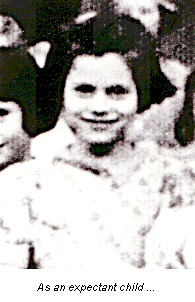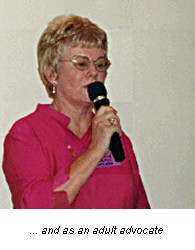 |
|
C-BERSS EX-PRESS
October 2003
Issue 3, Vol 6
|
|
|  |
 |
All Newsletters : October 2003 : Quest For "An Identity"
Quest For An Identity
A Personal Story ...
Maureen Briggs-Trewin came to Australia in 1953 from an orphanage in England when she was just eleven years of age.
She spent the next five years living at Nazareth House in Geraldton before being sent to Moora to work as a domestic at age 16.
A determination to reconnect with her own personal past has translated into an equally strong passion to help other former child migrants who have been similarly disconnected. Maureen told her story to C-BERS Counsellor, Sjoukje Tarbox.
My story begins much the same way as that of many other Child Migrants. I was born to a single mother who, although she desperately wanted to keep me, was forced by family, social and religious pressures to place me into a Catholic orphanage in Hammersmith London.
 How did I get to Australia? I remember one September day the Archbishop came to visit with some other very important people. The Nuns assembled us into the hall and these people told us all about the wonders of Australia. At the end of the talk, we were asked if we would like to go to Australia. Thinking it was a day trip, I put up my hand. How did I get to Australia? I remember one September day the Archbishop came to visit with some other very important people. The Nuns assembled us into the hall and these people told us all about the wonders of Australia. At the end of the talk, we were asked if we would like to go to Australia. Thinking it was a day trip, I put up my hand.
What a journey... first it was off to hospital to have my tonsils out, then onto the ship, the New Australian, for six weeks. The trip wasn't too bad except that we weren't allowed off the ship at any of the ports along the way. The only bad memory I have is when they cut my beautiful long wavy hair. I can still see it falling to the floor.
Boy did I get a shock when we arrived in Fremantle. There were two Nuns from the Hammersmith Orphanage waiting for us. I wanted to know where was the Aunty and Uncle they had promised?"
The Nuns gathered us together and took us to an orphanage in Wembley. Next day it was onto a bus for what seemed like a very long trip. I chattered and asked so many questions, but kept being told to be quiet. The trip ended at an orphanage in Geraldton, where I was to stay until I was 16 years of age.
Life at Nazareth House was ruled by very strict discipline; lots of hard physical work and, while some of us were subject to physical, mental and humiliating abuse, it was also my safe haven with my familiar friends.
At aged 16 a very scared young girl was given a battered suitcase, some second hand clothes, two pounds, and a nametag and sent on yet another long bus journey. I had no idea where I was going, how long it would take, and why was I being sent away from my friends to some place called “Moora”. (I now know - it was because the Nuns were no longer being paid to keep me!). My fate was to work on a farm in Moora, as a domestic.
It was hard work, long hours with no wages and no holidays, just board and keep. At Moora, I came to understand that I was “a nobody”, no identity, nobody cared! I ran away twice, and the Welfare people brought me back. Noone, not even the Welfare people, would answer my questions.
I learnt that the only way I could leave was to resign... so I did.
I made my way back to Nazareth House only to be told “you can't stay here, this is not your home”. They did let me stay the night. Next day I travelled to Perth and joined the girls going to work at St Thomas Moore College. It was there I got my first-ever pay packet £7.10.0. My life took a different turn, it was much happier, although always eating away at me was the question "who am I?"
For years I questioned and questioned — religious orders, governments both here and overseas only to be told “you are an orphan. Your parents were killed in the War”. Any documentation given to me had false information.
I tired of domestic work and tried my hand at nursing. Many of the matrons I worked for encouraged me to do formal training, but my fear of failure prevented me from even trying.
As a Child Migrant, I felt alone. The only people I could turn to were fellow Child Migrants. I didn't have the skills or knowledge to know where to go for help or even if help was available.
In my twenties, I met Colin (now my ex-husband) and gave birth to two beautiful sons. Colin, who was a Police Officer wrote to the Police in Manchester and other organisations such as the Red Cross, the Salvation Army and many others, to try to track down information on my family background. He was supportive but the “monkey on my back” of not knowing my identity became an obsession for me.
Colin also helped me with my education which had been very limited. He arranged for me to have correspondence lessons, pushed me to study and helped me prepare for my interview to become a Prison Officer and for my exams, which I was required to take after my first year of probation. He taught me to investigate, and how to ask for what I needed to know.
Had it not been for Colin’s support and guidance, I would not have become the person I am, nor would I have had the career I have today.
Then, after years of searching, in 1991, the Child Migrant Trust contacted me with news of my family.
Finally, I was a somebody. I had an identity and... I had a brother. Never again would I carry the stigma of being an orphan.
The night I was told this news I wanted to stand on the roof of the hotel and tell the world. Sadly, I was too late to meet my mother who had died at age 57.
In May 2002, I celebrated my 60th birthday. As part of a week long celebration, I re-visited many of the phases of life: St Thomas Moore College, where they put on a luncheon: the site of Mt Henry Hospital; Fremantle Jail and many more.
At times it was an emotional roller coaster ride but it made me realise what a unique family we Child Migrants are.
Throughout our early lives we had only each other, and we were there for each other.
That friendship and sense of extended family remains to this day.
The whole process of trying to find my own identity, and particularly my contact with the Child Migrants Trust in the 80s, made me more aware of the issues facing Child Migrants.
 >
I became obsessed with wanting to help other Child Migrants. >
I became obsessed with wanting to help other Child Migrants.
I felt that we needed to be heard and our stories needed to be told. So I did television interviews and radio talk backs. These days, I am also involved with a Committee for a Commemorative Plaque honouring the Child Migrants.
Whilst my life has had its share of adversity, I look forward to the future with great anticipation.
In just a few weeks, my brother and his family arrive from England for their first holiday in Australia. All my family are excited and even my grandchildren can't wait to meet their "pommy" cousins.
Shortly, I hope to retire after 30 odd years in the prison service, and retreat to my hills home to share retirement with my partner of eight years.
But, as my partner says, “a hermit you won't become, not while there are still Child Migrant issues to address and not while there are still people less fortunate than you".

|
|




 How did I get to Australia? I remember one September day the Archbishop came to visit with some other very important people. The Nuns assembled us into the hall and these people told us all about the wonders of Australia. At the end of the talk, we were asked if we would like to go to Australia. Thinking it was a day trip, I put up my hand.
How did I get to Australia? I remember one September day the Archbishop came to visit with some other very important people. The Nuns assembled us into the hall and these people told us all about the wonders of Australia. At the end of the talk, we were asked if we would like to go to Australia. Thinking it was a day trip, I put up my hand. >
I became obsessed with wanting to help other Child Migrants.
>
I became obsessed with wanting to help other Child Migrants.